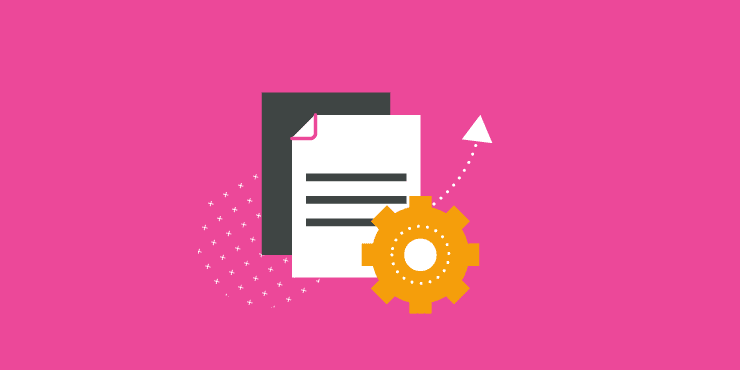Last updated on 24th November 2023
Workload management is all about prioritising your tasks and using your time wisely. Easier said than done, right?
But managing your workload is key to maintaining a healthy, productive lifestyle. Plus, it helps you to keep doing your very best work.
By learning to manage your workload, you can take control of your time and avoid burnout.
In this article, we’ll go through different tips and tools to help you do this…
1. Understand what’s truly important
Ask yourself the question, what are the tasks and projects that will have the biggest impact on your work?
Once you know what’s most important, you can focus your energy on those things and let go of the less critical tasks.
This doesn’t always necessarily mean ‘what is due next’. It could be simple admin tasks that make the biggest impact.
2. Set priorities
Once you know what’s most important, it’s time to set some priorities.
What needs to be done first? What can wait?
A good place to start is to sort your tasks by date or deadline, that way you’ll be crossing off tasks that need doing first. 96% of people feel that having a to-do list to work through makes them more efficient and productive. Plus it saves you the stress of rushing a task close to when it’s due.
By setting priorities, you’ll be able to focus your energy on the most important tasks and get them done more quickly and efficiently.
You can use systems such as the Eisenhower Matrix to help with this. This video from Project.co’s founder Matt Byrom talks you through the process:
3. Delegate and outsource
One of the best ways to manage your workload is to delegate and outsource. Especially if you have a team of employees.
If there are tasks that someone else can do just as well or better than you, delegate them!
This may seem unnatural at first, but it will free up your time so that you can focus on the tasks that are most important to you.
You can also outsource tasks to professionals or services. Using sites such as Virtual Employee or Freelancer.com can be a great way to free yourself up to work on other tasks.
4. Take breaks
When you’re feeling overwhelmed, it’s essential to take breaks, which may sound counterintuitive, but it may be exactly what you need to re-focus.
Step away from your work and take some time for yourself, whether that’s going for a walk, listening to music, or just relaxing for five minutes.
Taking breaks will help you stay refreshed and focused to be more productive when you return to work.
5. Stay organised
Staying organised is key! Keep your workspace clean and tidy, and make sure all of your files are organised (we’re talking about those messy desktops and Google Drive files too!)
Having a system in place will help you stay on top of your work and avoid feeling overwhelmed.
There’s nothing worse than needing a file and not being able to find it. With Project.co there’s a dedicated files section for every project you create. This helps you stay organised on all of the projects you’re working on, plus makes them accessible to the whole team working on them.
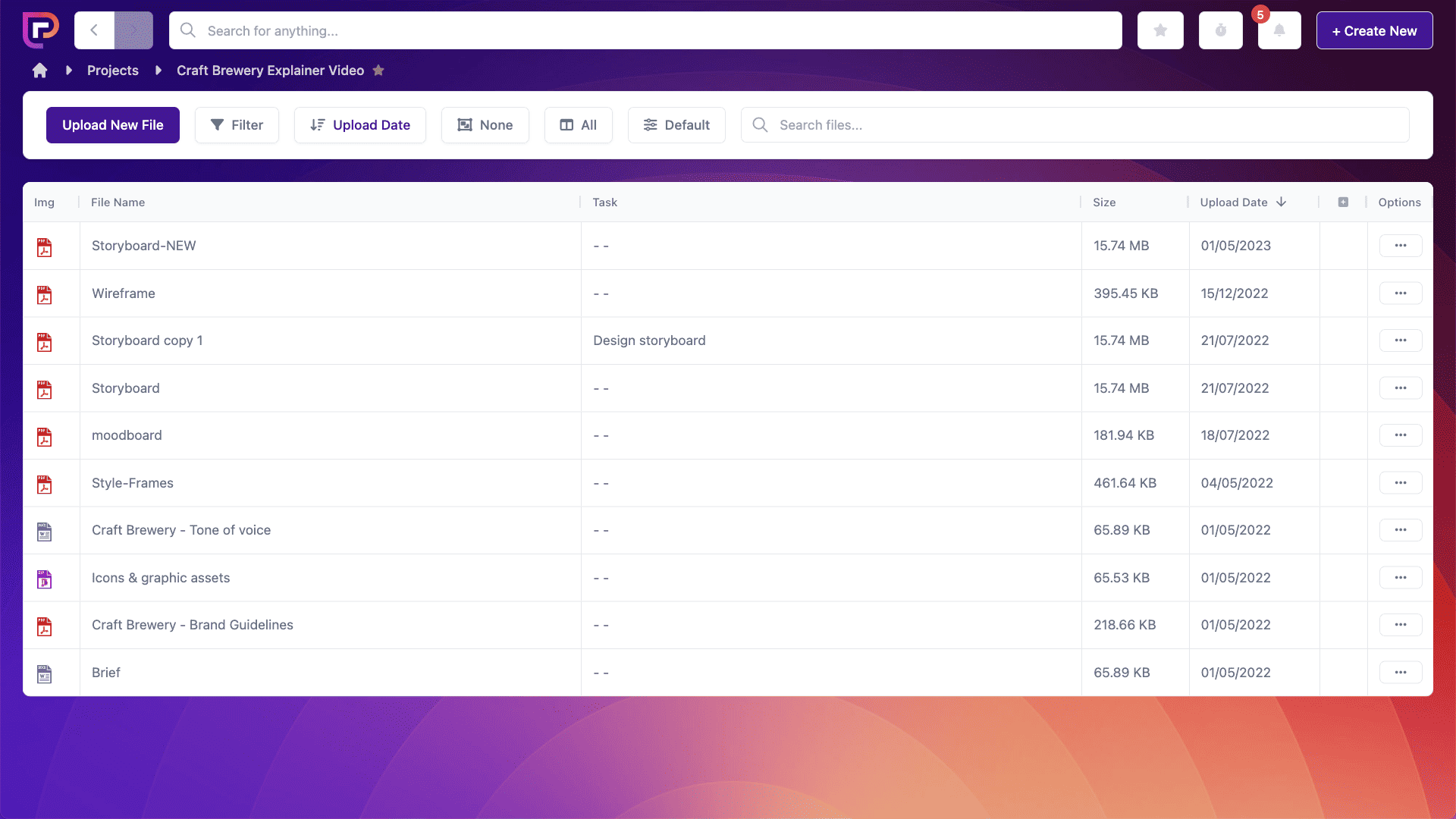
6. Set realistic goals
When it comes to managing your workload, setting achievable goals is crucial. For example, if you’re planning to work for four hours, plan enough work for those set hours and don’t try to do too much.
If you set unrealistic goals, you’re more likely to become overwhelmed and stressed out when you can’t complete everything.
7. Say no
Sometimes, the best way to manage your workload is to simply say no.
If you’re feeling overwhelmed, it’s okay to turn down new projects or requests.
You don’t have to do everything, and sometimes it’s better to focus on a few things and do them well than to try to do too much and end up feeling stressed out.
8. Don’t procrastinate
Procrastination is the enemy of productivity.
If you’re finding yourself putting off important tasks and doing something else, stop!
Make a list of what needs to be done and start tackling it one task at a time. The sooner you get started, the sooner you’ll be finished.
Sensa has tools that can help put together a personalised anti-procrastination plan to help you stay focussed.
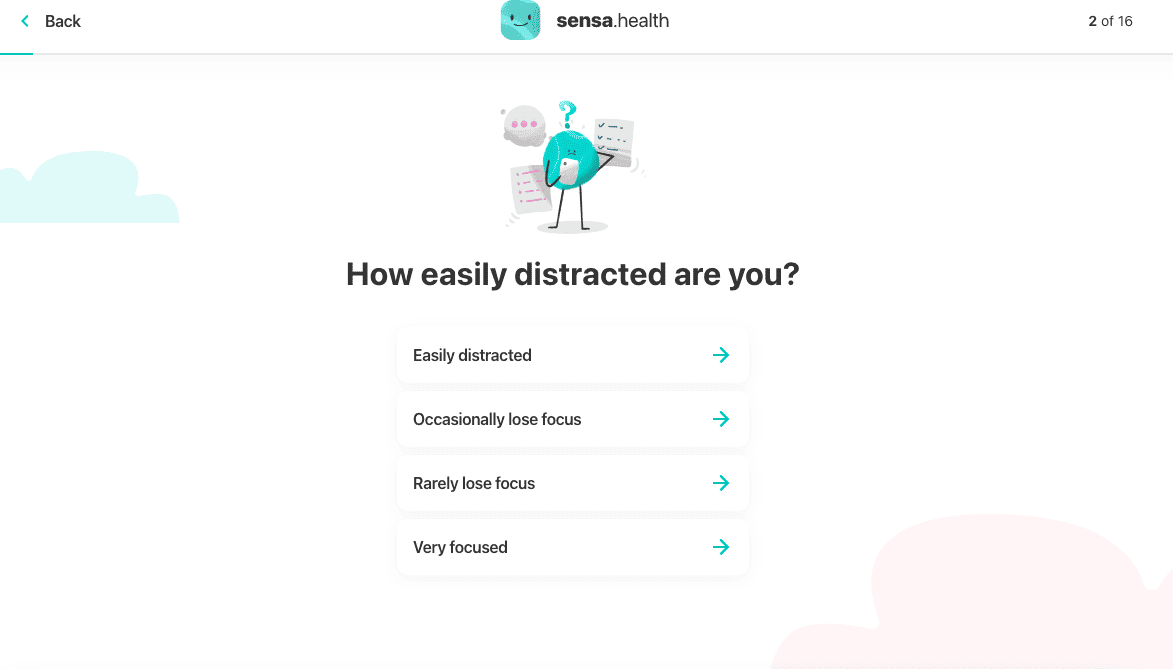
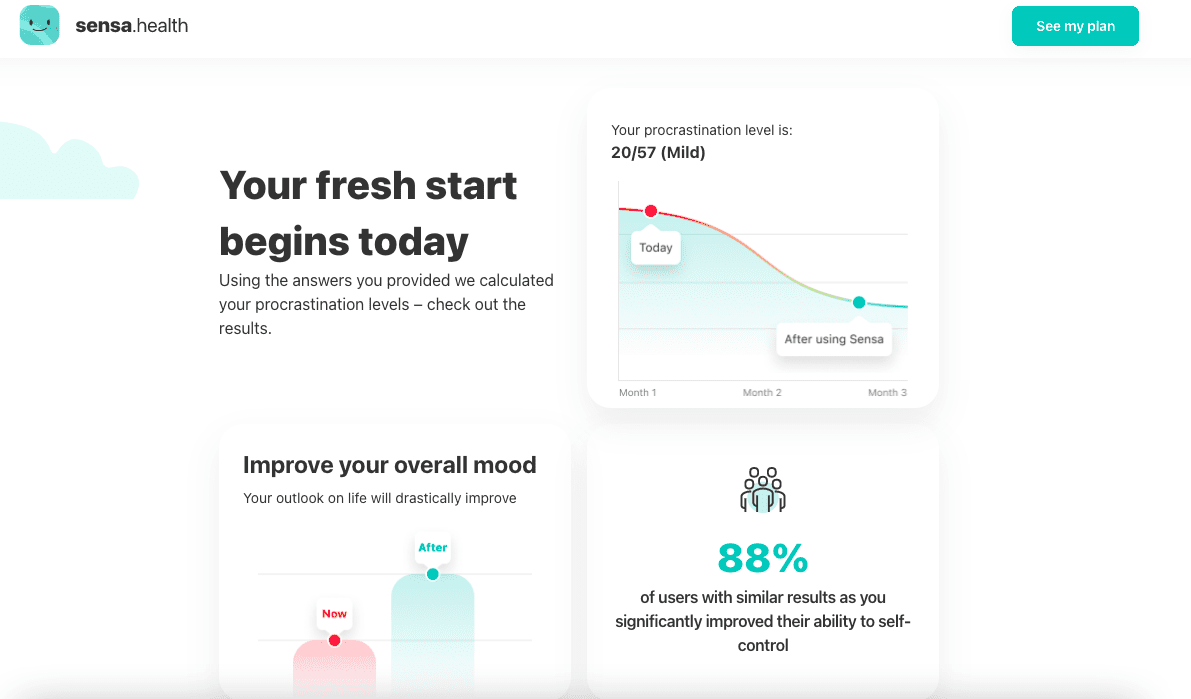
9. Keep a workload management planner
A workload management planner is essential for keeping track of your tasks and priorities.
By having a clear overview of what needs to be done, you can better allocate your time and resources.
Project.co has a tasks section that allows you to manage your workload easily. Each task can be allocated to different team members or groups and includes dates, important information and links.
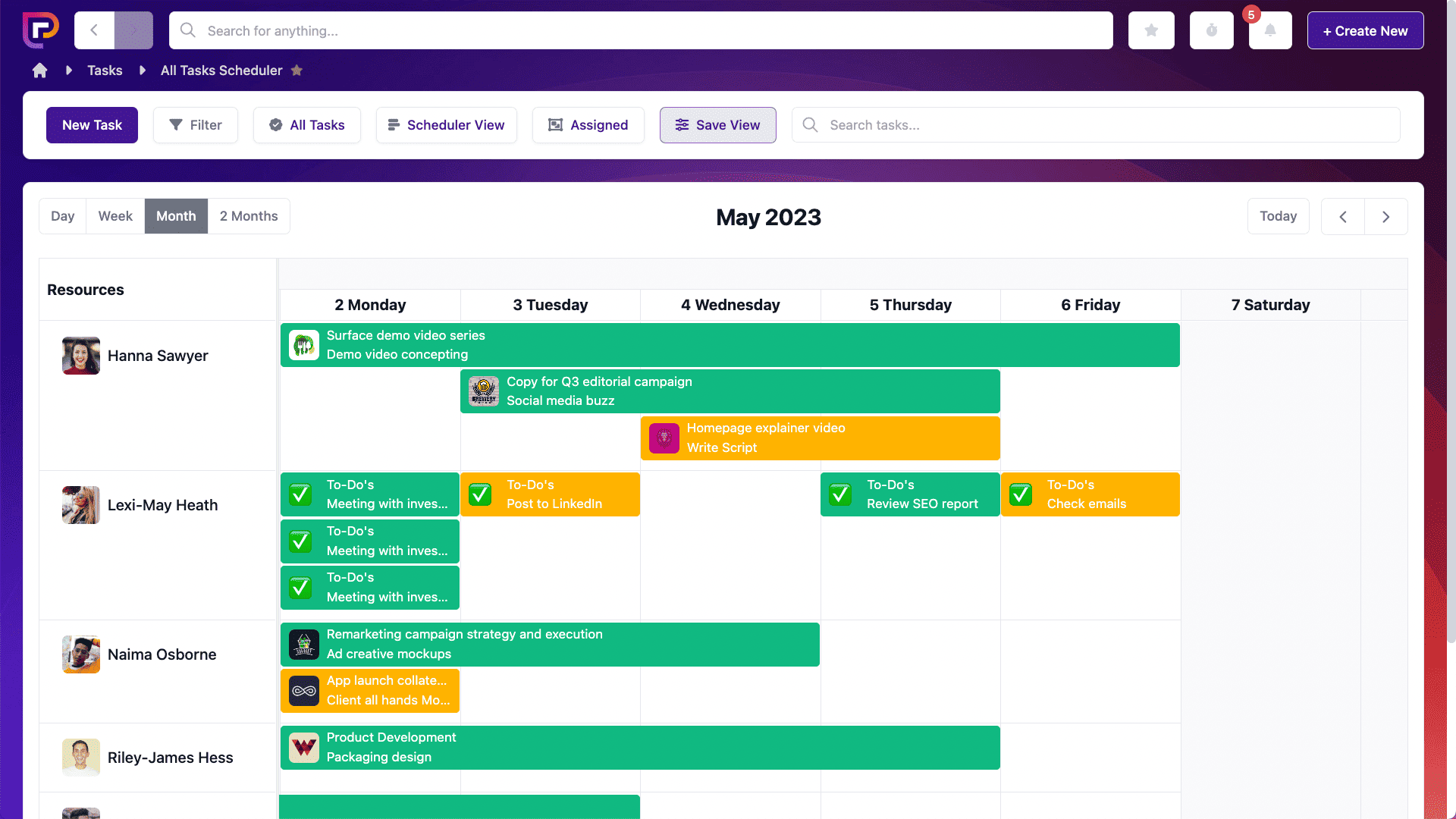
10. Use a time management tool
Sometimes the day can just get away from you, whether that’s in meetings, or on tasks. But there are many great time management tools available online or as apps.
These can be helpful for tracking how you spend your time, setting goals, and staying on track.
Harvest allows you to estimate your time needs and set expectations, plus track time spent on tasks.
11. Avoid multitasking
Multitasking can actually make it harder to get work done, so avoid it when possible. It can even lead to a 40% reduction in productivity.
Working on one task at a time, and giving it your full attention is a better way to approach your work. This will help you stay focused and productive.
Plus, if you work on a task-by-task basis, you can tick each one off a list as you go, this is really satisfying!
12. Set boundaries
It’s important to set boundaries. You can’t do everything, and that’s okay!
Know your limits and stick to them. This will help you avoid feeling overwhelmed and stressed out.
Setting boundaries can also apply to your team. You can let them know when you’re unavailable and when you need time to be focused. Do this by setting time in your calendar or putting your online status as ‘Away’.
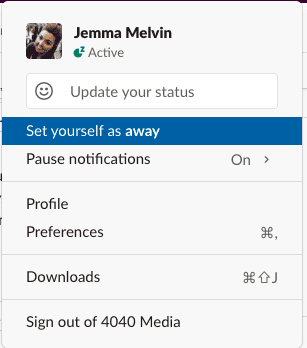
13. Take care of yourself
It may seem basic, but it’s important to take care of yourself. Make sure you’re eating healthy, exercising, and getting enough sleep.
When you’re taking care of your body, you’ll be able to better manage your workload and avoid burnout.
14. Simplify your life
One way to reduce your workload is to simplify your life.
Not to sound all Marie Kondo on you, but decluttering your home and office, and streamlining your schedule can have a great impact on your workload management.
For example, a simple change such as meal prepping your lunch for the week can make a difference. This will give you a healthy lunch to eat, plus free up your break time for a proper, more relaxing break.
15. Automate if possible
Automation can help take some of the load off of your shoulders. Especially when it comes to admin tasks that seem to fill your day.
Look for ways to automate processes so that you can focus on other tasks.
For example, Zapier allows you to integrate web applications so you can automate parts of your workflow.
16. Keep a positive attitude
When you smile, it automatically makes you sound more upbeat and happy. It’s amazing how much this can help you power through tough times and challenging tasks.
The Calm app has dedicated sections that can help you with stress and anxiety, even focus. Tools like this can help you keep a positive mindset, which in turn can help you manage your workload.

17. Keep learning and expanding your skillset
Learning new skills, whether that’s learning new software or a new time-saving technique, will always make managing your workload easier.
Plus, having new skills to add to your CV can help you advance in your career.
Sites like Skillshare give you access to thousands of courses that can help you up skill to make managing your workload easier.
18. Work smarter, not harder
There’s no point in putting in long hours if you’re not being productive.
It’s better to choose the times of day you are most productive and work solidly during those times.
If you need time to focus, block out your calendar. Especially if it’s likely you could be put in lots of meetings/calls.
Read more about time blocking here.
19. Prepare in advance
It may seem to be counterproductive to have one of your tasks as ‘Plan for the next day’ but it can really help you get your next working day going.
Take the last fifteen minutes of your day and use them to make a to-do list for the next day. Even if this means carrying over tasks for your current day.
It’ll help you make the most of your time overall.
20. Split up your tasks
Breaking a project up into tasks should always be the first step. But then take it even further by breaking up each task further which can make everything a bit more digestible.
This can also help you delegate different parts of each task to a wider team.
The tasks function on Project.co can help with this, you can set each task for different people or for different days.
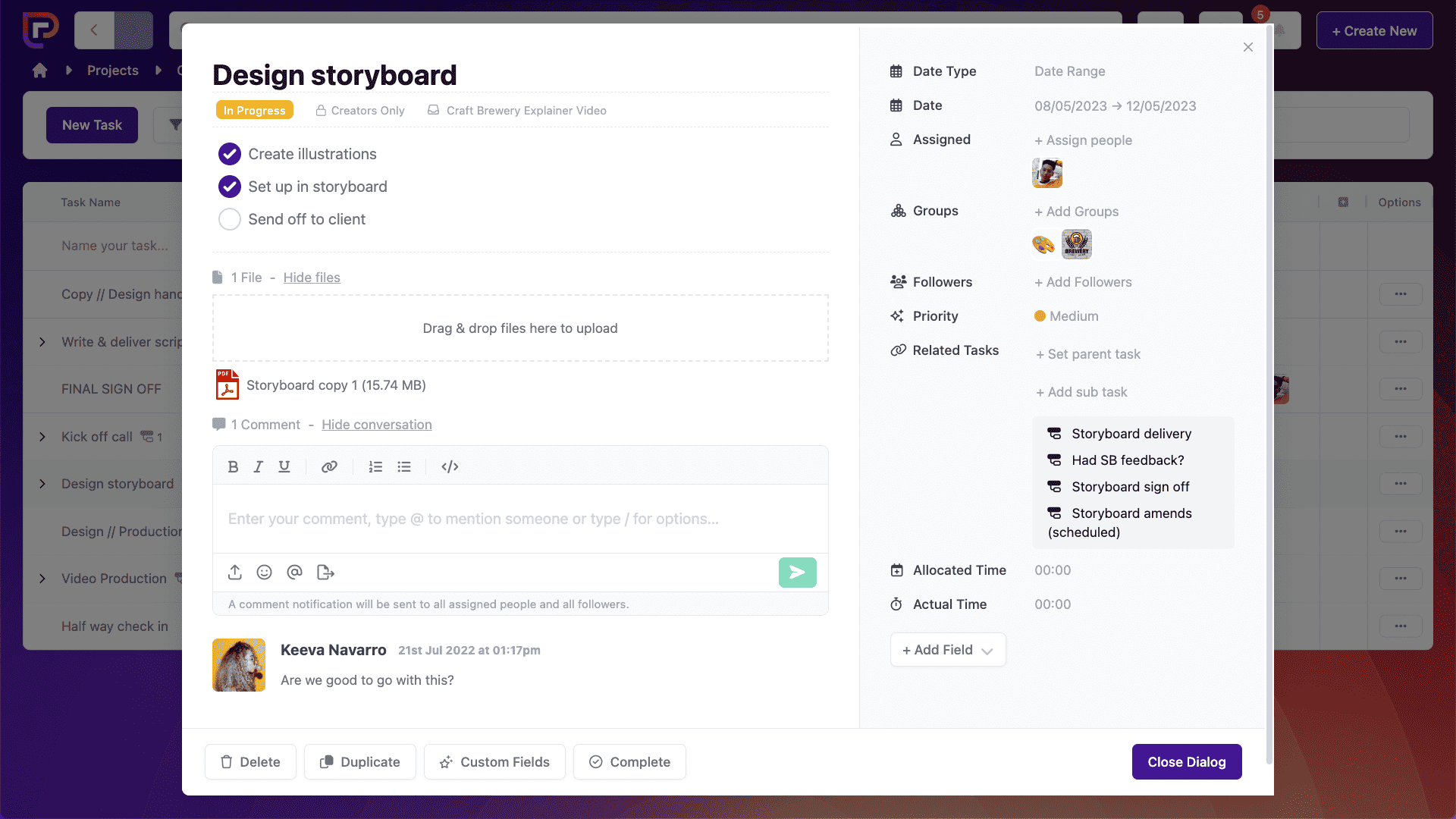
21. Have effective meetings
Starting or ending your day with a catch-up can really help you with your workload as a team.
Knowing where everyone is up to can make room for more tasks to be completed or can highlight if someone needs further help with a current task.
Make the meetings short and sweet in order to not waste time, and always go in with an agenda ready.
22. Track your time
Tracking your time doesn’t have to be scary. It’s not about ‘beating the clock’, it’s about making sure you are using your time effectively and wisely.
Also, by tracking your team’s time you get a view of productivity. It can highlight if someone needs help on a task, or if a task should have been completed already.
There are many tools online that can help you with this, such as Clockify.
23. Share your admin
Admin can sometimes be the majority of your workload and admin tasks can really eat into your daily productivity.
Getting some help with these tasks can free you up for actual project work. Whether that’s automating some tasks, (see point 15) or dividing these tasks up to your team.
If you work alone, look into getting a virtual assistant. These are people who can work for you, but it’s totally remote, so you don’t need an office or workspace to have one.
24. Avoid perfectionism
Although striving to do your best is obviously a good thing, it can be a hindrance.
Workload stress management is hard enough, so adding perfectionism on top of that can reduce your productivity and, by extension, have a negative impact on team productivity and project success as a whole.
So, give yourself a pass sometimes, and learn from any mistakes made.
25. Celebrate your achievements, big and small
It’s important to take a step back and look at what you achieve on a daily basis.
This will help you stay motivated and focused on your goals.
And if you have a team, make sure that you celebrate when they achieve good things too. It doesn’t always have to be the ‘big’ things, it can be things like great teamwork.
26. And finally, don’t forget to have some fun!
Work shouldn’t be all about stress and deadlines – enjoy the process and find what brings you fulfilment in your career.
If you use the tips above to help manage your workload, you’re bound to be successful!
To find out how Project.co can help you with your workload management, get started for free or read this article for more advice on time management.

